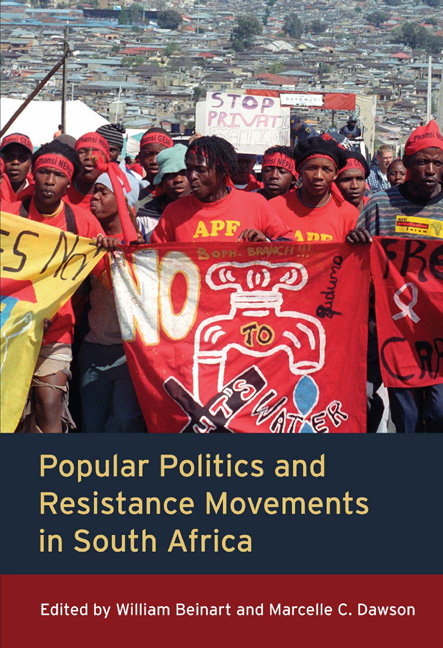Book contents
- Frontmatter
- Contents
- Contributors
- List of Abbreviations and Acronyms
- 1 Popular politics and resistance movements in South Africa, 1970–2008
- 2 The Durban strikes of 1973: Political identities and the management of protest
- 3 ‘There's more to it than slurp and burp’: The Fatti's & Moni's strike and the use of boycotts in mass resistance in Cape Town
- 4 The role of the African National Congress in popular protest during the township uprisings, 1984–1989
- 5 Strategies of struggle: The Nelson Mandela campaign
- 6 From removals to reform: Land struggles in Weenen in KwaZulu-Natal, South Africa
- 7 From popular resistance to populist politics in the Transkei
- 8 ‘It's a beautiful struggle’: Siyayinqoba/Beat it! and the HIV/AIDS treatment struggle on South African television
- 9 The Nelson Mandela Museum and the tyranny of political symbols
- 10 Black nurses’ strikes at Baragwanath Hospital, Soweto, 1948–2007
- 11 The ‘New Struggle’: Resources, networks and the formation of the Treatment Action Campaign (TAC) 1994–1998
- 12 New social movements as civil society: The case of past and present Soweto
- 13 ‘Phansi Privatisation! Phansi!’: The Anti-Privatisation Forum and ideology in social movements
- Endnotes
- Bibliography
- Index
13 - ‘Phansi Privatisation! Phansi!’: The Anti-Privatisation Forum and ideology in social movements
Published online by Cambridge University Press: 21 April 2018
- Frontmatter
- Contents
- Contributors
- List of Abbreviations and Acronyms
- 1 Popular politics and resistance movements in South Africa, 1970–2008
- 2 The Durban strikes of 1973: Political identities and the management of protest
- 3 ‘There's more to it than slurp and burp’: The Fatti's & Moni's strike and the use of boycotts in mass resistance in Cape Town
- 4 The role of the African National Congress in popular protest during the township uprisings, 1984–1989
- 5 Strategies of struggle: The Nelson Mandela campaign
- 6 From removals to reform: Land struggles in Weenen in KwaZulu-Natal, South Africa
- 7 From popular resistance to populist politics in the Transkei
- 8 ‘It's a beautiful struggle’: Siyayinqoba/Beat it! and the HIV/AIDS treatment struggle on South African television
- 9 The Nelson Mandela Museum and the tyranny of political symbols
- 10 Black nurses’ strikes at Baragwanath Hospital, Soweto, 1948–2007
- 11 The ‘New Struggle’: Resources, networks and the formation of the Treatment Action Campaign (TAC) 1994–1998
- 12 New social movements as civil society: The case of past and present Soweto
- 13 ‘Phansi Privatisation! Phansi!’: The Anti-Privatisation Forum and ideology in social movements
- Endnotes
- Bibliography
- Index
Summary
Introduction
At the outset of this volume, attention was drawn to the persistence of inequalities that continue to characterise South African society more than a decade after the transition to democracy. Much of the work presented here concentrates on popular protest and resistance movements during and after apartheid, which have in various ways and to differing degrees shaped the country and continue to influence political debate and policy matters. This chapter is concerned with popular protest in the post-apartheid period and adopts as its vantage point one of South Africa's ‘new social movements’, namely the Anti-Privatisation Forum (APF). The discussion uses the APF's struggles against the commodification of water services as a lens through which to gain insight into the ideology that drives this movement's grassroots struggles in Johannesburg, South Africa.
The APF is an umbrella organisation that in 2008 comprised 27 community affiliates, three political groupings and a number of individual supporters. The forum defines its main task as mobilising working-class communities against privatisation in the spaces where they live and work. According to the organisation, ‘[t]he APF links workers’ struggles for a living wage and jobs with community struggles for housing, water, electricity and fair rates and taxes’. It sees itself as an open platform where people can collectively discuss the implications of privatisation.
The APF endeavours to bring together communities that may be engaging in isolated struggles, as well as individuals who may have internalised their suffering, to share experiences and strengthen the struggle against privatisation. Key texts on social movements globally characterise such social expressions as single-issue movements. The APF, however, does not have such narrow aims. It frames its mobilisation efforts in terms of broader questions around ‘the relationship between new forms of exploitative capitalist reproduction and working class struggle’. Drawing on social movement literature, this discussion offers an explanation for the emergence of movements such as the APF and considers the ideological content and practical forms of the APF's opposition to the commodification of water services. These struggles are considered against the backdrop of popular resistance that characterised the apartheid era and that sparked democratic transition. In taking this approach, the chapter highlights some of the changes and continuities in popular protest in South Africa.
- Type
- Chapter
- Information
- Popular Politics and Resistance Movements in South Africa , pp. 266 - 285Publisher: Wits University PressPrint publication year: 2010



